Disclosure: Meeple Mountain received a free copy of this product in exchange for an honest, unbiased review. This review is not intended to be an endorsement.
John D. Clair appears to be everywhere these days. One of the most prolific designers of the last three years had his hands on many of AEG’s most popular titles, like Space Base, Ready Set Bet, Mystic Vale, and this year’s Dead Reckoning.
Imagine my surprise, then, when I stopped by the Brotherwise Games booth at Gen Con 2022 to see a new title on one of their demo tables designed by someone named… John D. Clair. I just assumed that Clair only designed for AEG, so that was surprise #1. Surprise #2 was that Brotherwise, best known for lighter games such as Boss Monster and Overboss, was bringing a Clair game, along with his design pedigree, into the fold.
Empire’s End, Clair’s latest creation, has players attempting to stave off the end of civilization. The game features some interesting “Clair” moments that’ll remind you of Space Base or No Thanks. But Empire’s End is a game all its own.
Christopher and Johnny O’Neal (the brothers behind Brotherwise) were kind enough to send a preview copy of Empire’s End ahead of the upcoming Kickstarter campaign. Now that I’ve gotten a few plays in, Empire’s End has some interesting moments, but these moments are upended by a game that, at this point, runs maybe a third too long.
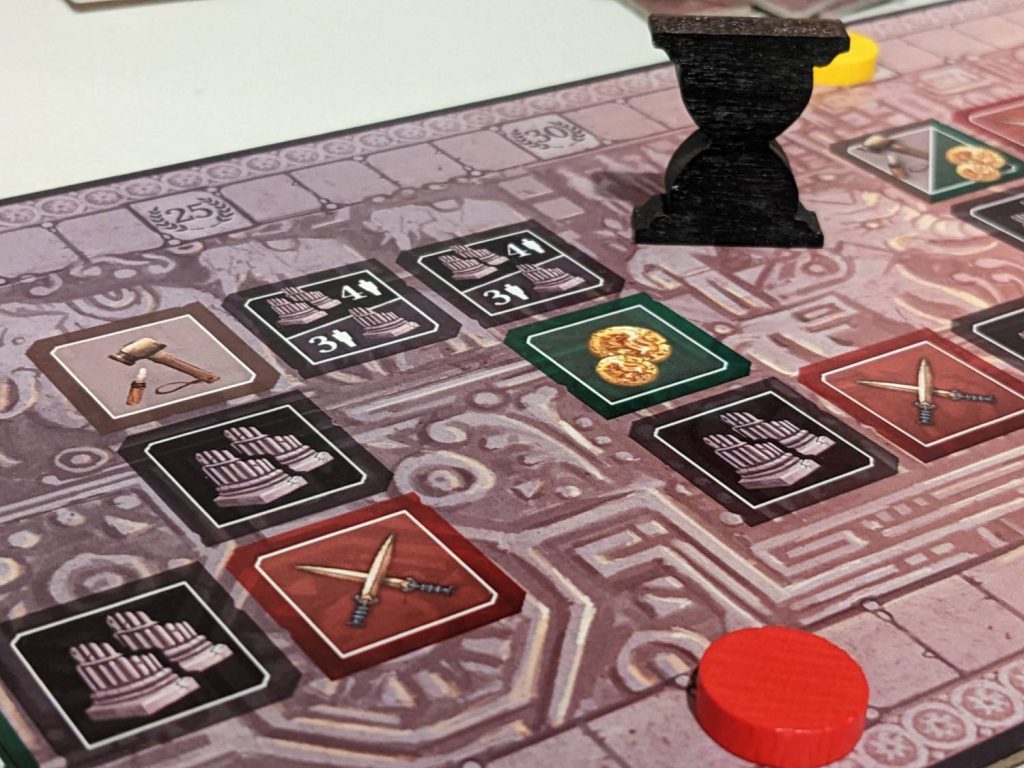
Empire on Fire
Empire’s End is mostly a bidding game, as players bid resources to ensure their ancient empire isn’t completely set on fire.
Let me explain: Each player starts the game with a set of 11 tiles representing their empire. These tiles have simple names like “City”, “Town”, “Road”, and “Farm.” (Yes, there’s an opportunity for creativity here.) The game’s variable setup comes from how the 11 tiles are spread out in front of each player. These tiles will start in different places each game, but all players will set up the empire using the same tile order.
Each of the tiles has a point value ranging from 3-32 points. The tiles earn their points at the end of the game if they are not on fire when play ends. How do you keep those tiles from being flipped and then set on fire? By managing each Disaster phase, which becomes a vital part of the gameplay.
The game board features a mix of four main types of spaces on the board:
- Disasters / Double Disasters: bidding to ensure you don’t have to flip a tile and lose end-game points (the latter are only featured on the 3-4 player side of the board)
- Economy: resource production and trading opportunities
- Conflict: players show combat strength to score end-game points and acquire resources
- Industry: a chance to build Innovation cards from hand, repair a single tile that is on fire, and possibly swap some of your tile locations
During a Disaster phase, bidding is simple. A card is revealed, naming one district (from 1-11, going from left to right in each player’s tableau) as being up for bid. You can stay out of trouble by bidding one of the game’s four resources onto that disaster card, based on what resource(s) are eligible to bid for that card. Bid one of those, and you get to pass and avoid disaster for the moment.
But if you don’t or can’t bid on a card, you take the card and tuck it under one of your other active, not-on-fire regions; this will grant an ongoing power depending on the phase listed on the bottom of that disaster card (the disaster card now becomes an Innovation). You’ll also get all of the resources that were bid on that card, which might be a boon if you need those resources for other bidding rounds later.
In exchange, you must flip that previously healthy tile that was up for bid. The backside of all tiles show that tile’s once-healthy landscape, but now on fire, and is now worth zero points at the end of play. You may be able to rebuild that portion of your tableau on a later Industry phase, but you’ll only have enough time to rebuild 3-4 districts total throughout the game.
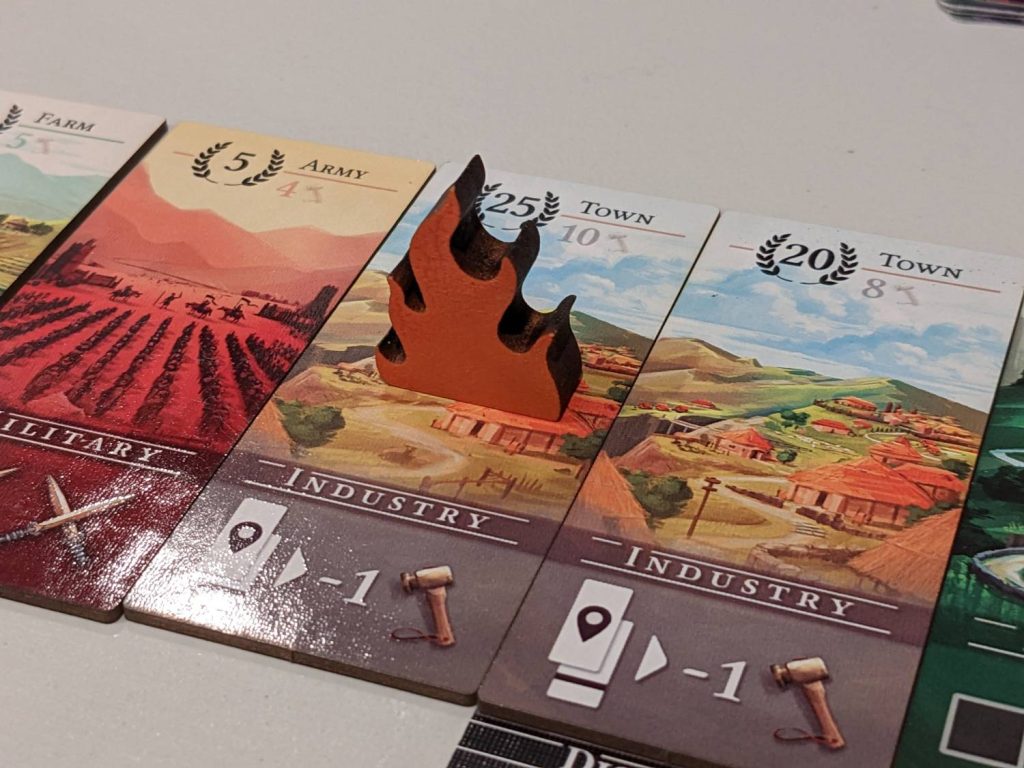
Don’t Overstay Your Welcome
The Disaster phase in Empire’s End is interesting, at least the first few times. But in a 3- or 4-player game, you are going to have at least a couple dozen Disasters make an appearance over the course of play.
For a game that claims it can be played in 60 minutes or less, that was not the case in the 3+ player games I tried. That’s because bidding wars take so much time and seem to play the zero-sum game to maximum effect. Eventually, all players will have to take on Disaster cards because other players will be flush with resources that can be used to bid in future rounds.
This led to one player in my review group saying that “it feels like each bidding round is just a chance for a player who picked up a big pile of wheat to pass along a good portion of that pile to a different player every turn.” This especially becomes true when the order of a player’s tableau changes. Later in the game, everyone’s empire will be in a different order thanks to certain game effects. So the #5 tile might be one person’s 3-point tile but another’s 25-point tile. No one wants to see that 25-pointer on fire, right? They’ll be bidding until they completely run out of stuff!
In most cases, there are back-to-back Double Disaster phases, with a whopping three straight Double Disaster phases to close out a 3- or 4-player game. It just feels like this step happens too many times in Empire’s End, disproportionately sucking the fun out of the experience.
Here’s where Disasters became a letdown in my plays: when the tiles up for bid weren’t worth many points. If your three-point tile is up for bid, you might just take the tile without even letting bids be placed. Who cares if you lose three points at the end of a game where you’ll score 172 points?
The scenario above happened almost exclusively in my only two-player game of Empire’s End, a game with my wife where none of the “good” tiles (anything worth 17+ points) ever came up for bid during a Disaster phase. None of our bidding rounds went more than four bids deep before someone just took the tile, and that game ended with a score of 153-146.
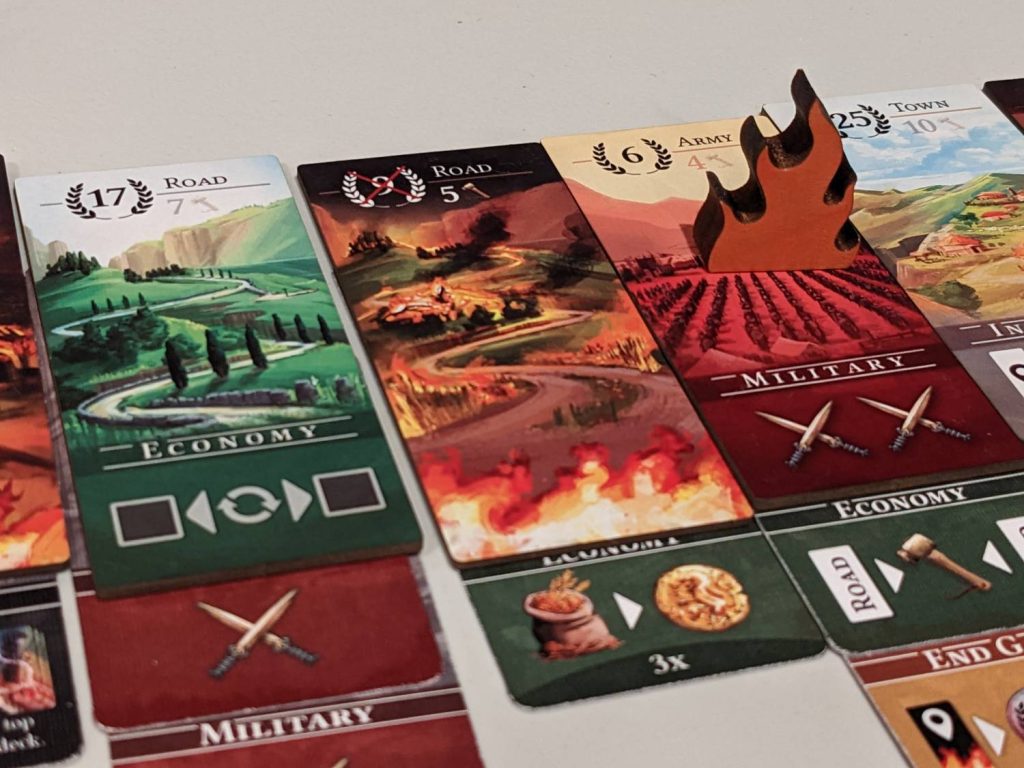
Firewalker
All this leaves Empire’s End in a tough place.
The game is easy to teach, it has some moments with the Disaster bidding system, and at two players, Empire’s End plays quite fast, especially if none of the best tiles ever come up for bid. I enjoyed the puzzle of figuring out which tiles to give up to get a lot of resources that I could use to protect my better tiles in future rounds.
Empire’s End is not exactly an engine builder, because you don’t get the chance to use your engine more than five times in any given game. Plus, you’ll only produce a small amount of stuff each time an Economy phase kicks off—hardly enough to be meaningful when the game is so short. In each game, your first two Economy phases might only give you one of each main resource, less if any of the tiles with listed abilities or tucked cards are on fire.
This made a couple of players ask a logical question: thematically, doesn’t it seem like your engine should be stronger to begin play, while slowly weakening all game long? I found that I was producing just enough stuff to stay above water in that first Economy phase, and if I was not setting tiles on fire or seeing piles of stuff coming up for bid, I was always hurting for resources later.
And that’s where recommending the game becomes dodgy. Due to a lack of spice, Empire’s End doesn’t feature many “wow” moments. With recent Clair designs like Ready Set Bet, there are lots of thrills, variety, powers, one-time benefits that really mean something. And horse tokens. Late-game turns of Space Base are always exciting because you’ve got an engine that really sings by the end.
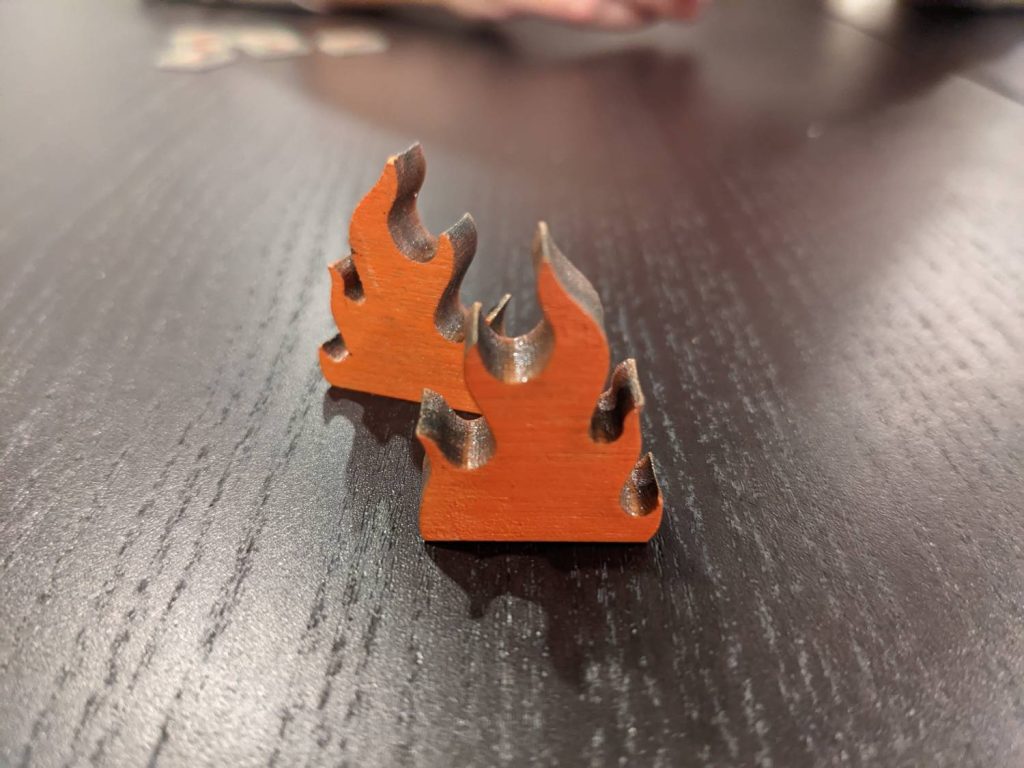
Empire’s End doesn’t have those feel-good moments, and worse, I’m really struggling to identify ways to make it better. I would start with less Disaster phases and more Economy phases, so that players actually have stuff to use in later turns. Disaster phases don’t have any kick when players are bidding over their lowest-value tiles, so maybe turning the Disaster phase into one that calls out specific point tiles instead of a sequence number would work better.
I haven’t even talked about the Conflict phases, which fell really flat in my three games (one game each at two, three, and four players). It almost feels inconsequential because as long as players have a certain strength threshold, they will score some number of points, and as a “penalty”, losing players have to move a tile around in their tableau. Save for the Conflict phase in the very last turn of the game, I’m not sure losing a Conflict has any real weight because players can swap tiles with an Industry phase action.
I’ve never seen a player take on negative points in the Conflict phase and most of the time, players do enough to score at least the second tier’s worth of points. I’m sure that Conflict could be the difference for a winning player, so I guess that you have to play along. It’s just not very interesting.
Each game of Empire’s End finished the same way: players looking around the table, giving the shoulder shrug of “not bad, not bad” while helping to pack up the game. Everything is fine here, but nothing really stands out.
A minor disappointment, Empire’s End is a game that is worth trying, particularly if you love games with a heavy dose of bidding as its main gameplay mechanic. For players itching for a more strategic version of No Thanks, which uses some of the same mechanics as players consider which cards/tiles to keep versus not keep, Empire’s End might also land well.


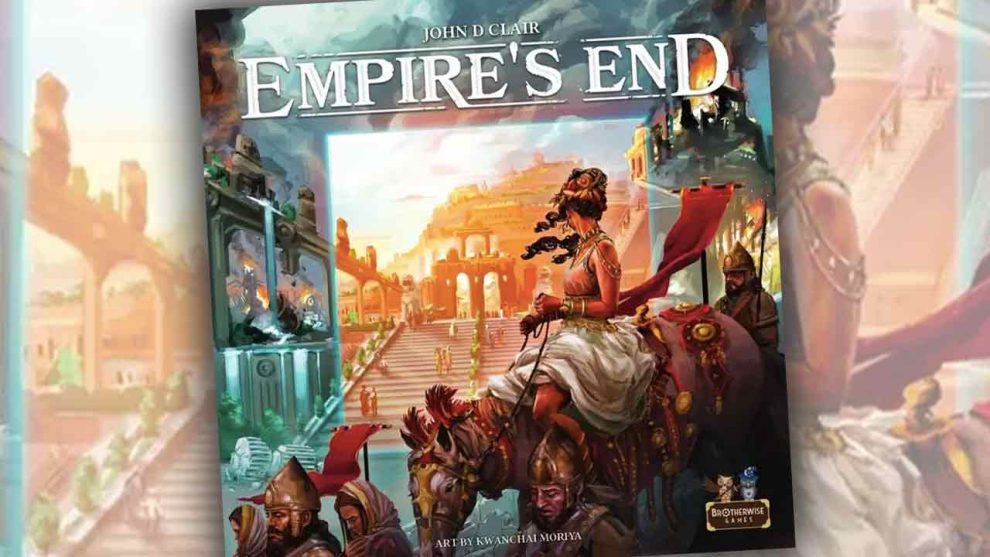









Add Comment